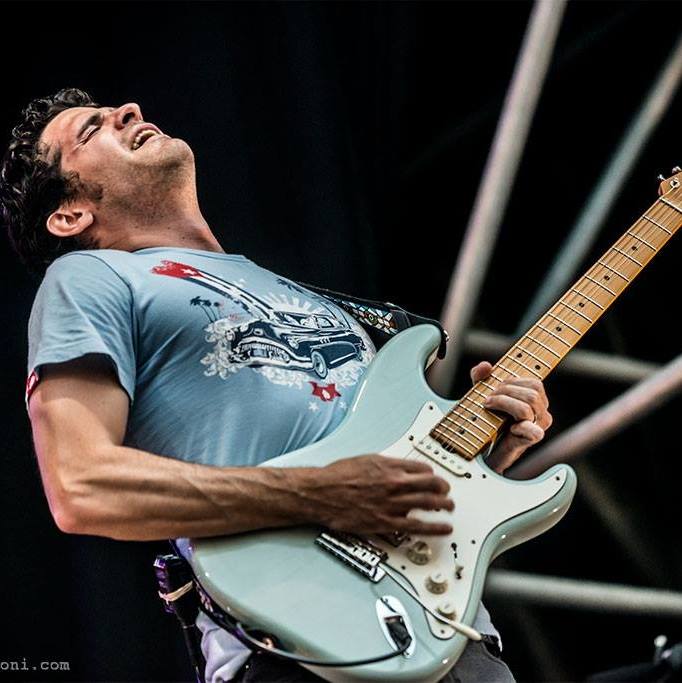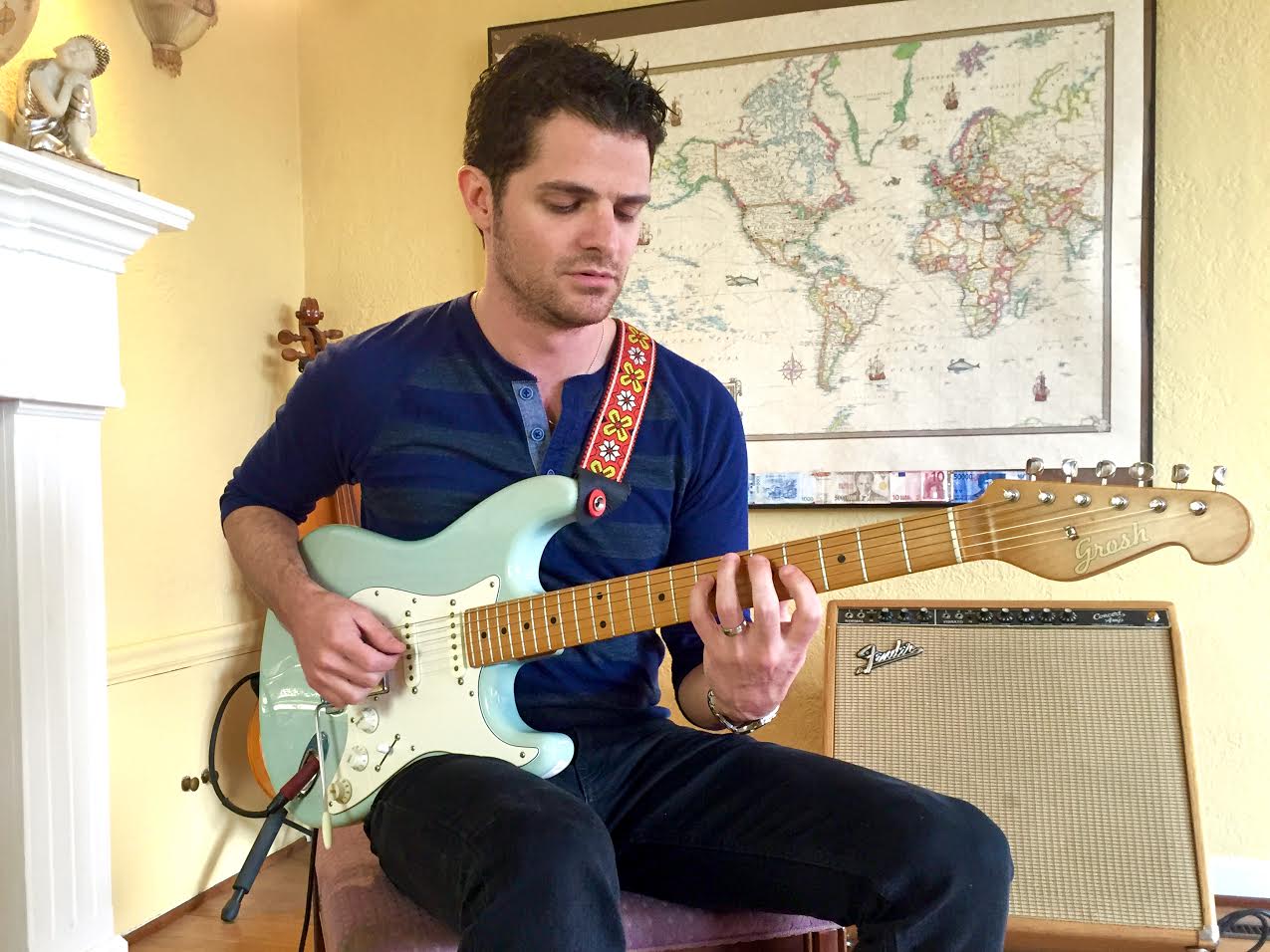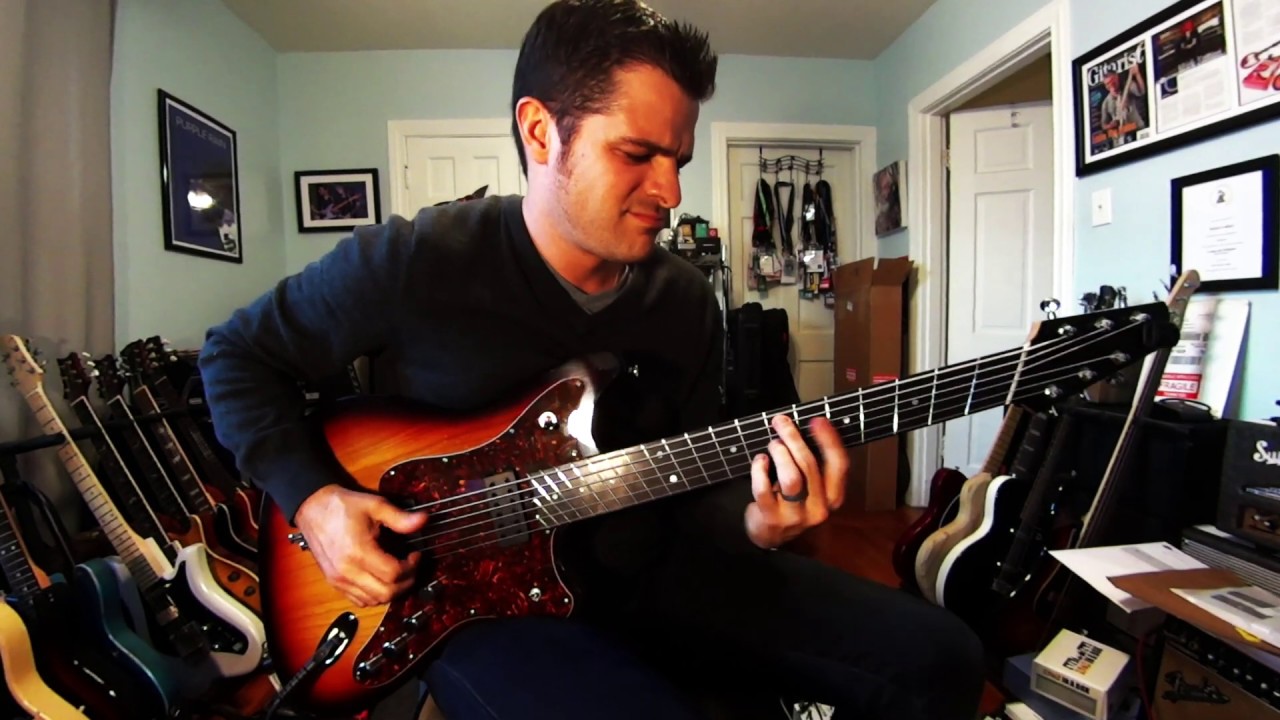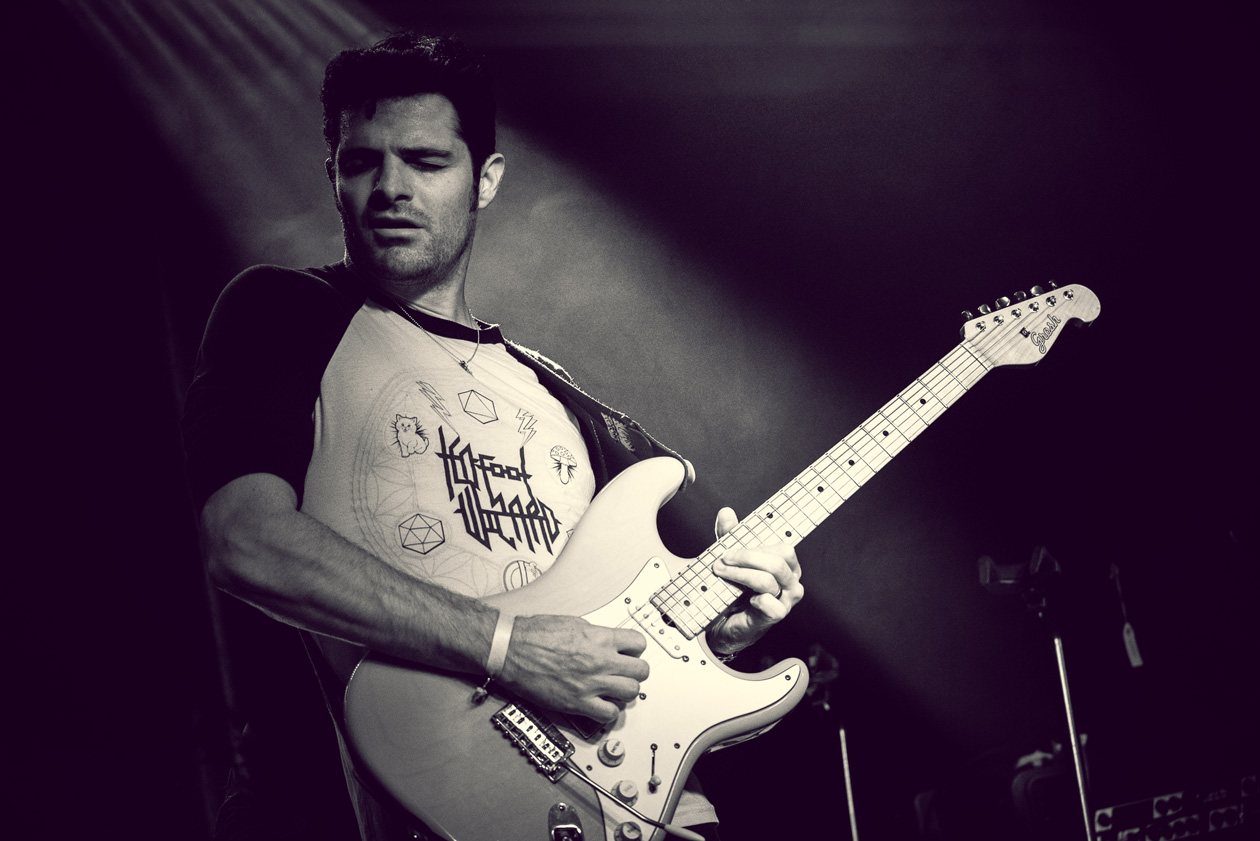Mark Lettieri: The Beauty of Instrumental Music
By Susan Frances
 If audiences can imagine one guitar that has traveled through the decades since its inception, used for playing across the music spectrum from blues, gospel and jazz to pop/rock and R&B, it is likely that guitar made its way into the hands of guitarist-producer-composer Mark Lettieri. Across the ages, the multiple expressions portrayed by guitar strings are embraced by Lettieri, who does not hold his guitar bound to one type of style but fuses multiple families of styles and creates a harmonious fusion.
If audiences can imagine one guitar that has traveled through the decades since its inception, used for playing across the music spectrum from blues, gospel and jazz to pop/rock and R&B, it is likely that guitar made its way into the hands of guitarist-producer-composer Mark Lettieri. Across the ages, the multiple expressions portrayed by guitar strings are embraced by Lettieri, who does not hold his guitar bound to one type of style but fuses multiple families of styles and creates a harmonious fusion.
Lettieri thinks beyond the man-made divisions imposed on audiences by the music industry and sees the guitar as an instrument that transcends music categories. It is a trait he developed in his youth while growing up in the San Francisco Bay area when he first discovered the guitar.
He explains what attracted him to the guitar, “I suppose you could say I stumbled upon it. Growing up, there were two acoustic guitars in the house: my dad’s steel string that he still plays, and my mom’s nylon string acoustic leftover from her college days – I don’t think she ever learned how to play it, but it found its way to our house nonetheless. And my parents would let me plink around on these instruments whenever I felt like making some noise.”
“Around age 11,” he remembers, “I started listening to the contemporary rock of the era, grunge, and realized that all this plinking around was something more serious – it could be a real vehicle for self expression, and ultimately, fun! The first time I got to play a distorted electric guitar at a music store in Palo Alto, California, I felt like I’d unlocked the key to the rock universe. That was it for me.”
“Even though rock music was technically my first love,” he recalls, “it didn’t take long to develop the desire for a solid groove, backbeat, and interesting harmony. I found that in soul, funk, and R&B music. The artists that were pinnacles of these sounds for me early were Stevie Wonder, George Clinton, and Steely Dan.”
“In college,” he determines, “I delved more into gospel music, listening to artists like Fred Hammond and Kirk Franklin. Of course Prince became a huge influence as well, along with contemporary soul artists like D’Angelo and Erykah Badu. Jazz guitarists like George Benson and John Scofield were also very important.”
He parlayed his studies of guitar playing into performing on a professional scale as he recounts, “The first paid gig I ever did, if memory serves, was at a middle school dance. I was probably a sophomore in high school, and had formed a band with some close friends. We were hired to play this dance at our former middle school, playing covers of everything from Chuck Berry to Sublime. We made $25 each! The students loved it. They asked for autographs, and we felt like kings! Ha!”
“As much fun as it was,” he relishes, “it wasn’t until much much later in my life that I realized I could actually have a career as a guitarist, but the passion for music was cemented back at age 11.”
Lettieri made the move to Texas where he attended Texas Christian University (TCU). There, he studied advertising and public relations, and competed in track and field. His music career took off properly in the Dallas/Fort Worth Metroplex area after graduating from TCU.
He reveals, “When I arrived on the music scene in Dallas/Fort Worth, Texas this crossover of soul, gospel, jazz and R&B was everywhere. It became an integral part of my workload as a professional, and a major factor in my artistic development as a writer as well.”
It was at this time while in Texas that he became a member of the Snarky Puppy in 2008, a jazz/world fusion group. His work with the group resulted in three GRAMMY Awards that include Best R&B Performance for the single “Something” featuring Lalah Hathaway in 2014, and Best Contemporary Instrumental Album for Sylva in 2016, and Culcha Vulcha in 2017.
He describes how he became a member of the Snarky Puppy. “I met the guys from working in the Dallas/Fort Worth ‘groove’ scene –  essentially that scene that blended all those styles mentioned above, including a lot of hip hop as well. We were all working as sidemen, session players, bandleaders, etc. I did a lot of gospel recording sessions with some of the Snarky guys, and we became fast friends.”
essentially that scene that blended all those styles mentioned above, including a lot of hip hop as well. We were all working as sidemen, session players, bandleaders, etc. I did a lot of gospel recording sessions with some of the Snarky guys, and we became fast friends.”
“Truth be told,” he confesses, “I was a fan of the band before I was asked to play. I started as a sub, filling in on gigs when the other two guitarists, Bob Lanzetti and Chris McQueen, were unavailable. However, I think Michael League, [the] bassist and bandleader recognized something in my sound and style that he felt was an asset to the band, and so I brought into the fold.”
He reflects, “Being in that band has definitely influenced the way I write and produce – I’ve learned a lot about arranging for different instruments, as well as how to convey complex ideas in simple, identifiable ways.”
Though Lettieri continues to perform and record with Snarky Puppy, he has also branched out on his own, having released five albums as a leader, which consist of Knows in 2011, Futurefun in 2013, Spark and Echo in 2016, Deep: The Baritone Sessions in 2019, and Things of That Nature in 2019.
The inspiration to go out on his own had been brewing inside him as he cites, “I’d been writing instrumental guitar music since I was 14. A lot of my early guitar influences were instrumentalists, like Scofield or Steve Vai, for example. So doing a record of my own instrumentals was bound to happen eventually.”
“With Knows,” he singles outs, “it was my first step. I had some songs I thought were good, and representative of where I was at that time as a player and writer, so it felt right to make that first artistic statement. The biggest challenge was probably learning how to perform the music live – how to convey it also as entertainment, not just art. Which can be hard to do with instrumental music.”
He notes that his current release Things of That Nature, “Again, it was just another step in my artistic journey. Since Knows came out in 2011, I’ve put out five records, and will have a sixth in early 2021. I guess that’s a pretty good pace, considering I’m not quite 100% a solo artist. Much of my time is still spent as a session player and sideman, plus with Snarky Puppy and other ensembles. But making my own music is where my creative heart really resides, so I have to answer to it as much as possible.”
Supporting Lettieri on Things of That Nature are Wes Stephenson on bass and Jason “JT” Thomas on drums, who with Lettieri form the Mark Lettieri Trio. He applauds, “not only are they some of the best players on Earth, they’re buddies of mine. So I lucked out! We had all played together on various sessions and gigs, and so it felt natural to ask them to work with me on my music. I think it’s a really great combination, and I definitely write much of the music with their sounds in mind.”
He describes, “Things of That Nature and the songs therein reflect, in general, my life as a new father and my experiences with family. The title is actually something my father-in-law says all the time!”
Lettieri has likely been able to spend a great deal more time with family members, and subsequently been influenced by them over the course of the COVID-19 related shutdowns. “I spend a lot of time with my family,” he prides. “We’re doing as much as we can during the COVID age, but have still managed to get in a fair amount of fun and make some messes around the house.”
Lettieri’s family had not only influenced the title of the recording but also influenced the song titles and music as he provides what was his inspiration for writing “Seuss Pants” from Things of That Nature. “I was practicing playing melodies with the vibrato bar, like one of my heroes, Jeff Beck, and the ideas came very quickly. I composed just about the entire melody first, and then added the chords around it. The title came from a pair of my wife’s pajama pants that have this pattern on them that reminds us of Dr. Suess books and characters. I think it’s one of the strongest songs I’ve written.”
Another strong track on the recording is “Chicory,” which features Bob Reynolds on tenor saxophone. Lettieri proclaims, “Bob’s also a close friend, and one of my favorite tenor players. I think at one point I’d submitted ‘Chicory’ to be played by the Bob Reynolds Guitar Band – a group of his that I’m a member of with Nir Felder, Kaveh Rastegar, and a rotating cast of drummers. We never got around to playing it, so I figured I’d put it on my record and get Bob to play on it that way! I really love his tone and phrasing on that track.”
 Transposing the tone and phrasing captured on the recording can come with challenges when Lettieri and his band play live but he asserts, “Not necessarily, since I always try to just write the best songs I can at those moments, and then worry about the live arrangements when the time comes. But, as is the case with a lot of my music, Things of That Nature included, the studio recordings have guitar overdubs and keyboard parts as well.”
Transposing the tone and phrasing captured on the recording can come with challenges when Lettieri and his band play live but he asserts, “Not necessarily, since I always try to just write the best songs I can at those moments, and then worry about the live arrangements when the time comes. But, as is the case with a lot of my music, Things of That Nature included, the studio recordings have guitar overdubs and keyboard parts as well.”
“One of the challenges,” he highlights, “has always been seeing if the songs will hold up in a stripped down, trio format. And for the most part, they do. However, recently I’ve been using a keyboard player on my live sets. While I still love the openness and flexibility that the trio provides, having keyboards keeps things a little closer to the studio feel, which can be positive for a lot of audiences. It also frees me up to play more rhythm guitar, and frankly, allows me to play more music from my catalog like the songs from Deep: The Baritone Sessions. Those songs definitely need more than three players!”
One aspect of Lettieri’s recordings he cannot control is the impact his music makes on audiences. On that subject, he professes, “I just  hope it helps them move forward in some way; have a good time, gain confidence or inspiration, maybe cope with a loss…anything positive, really. But even if the music conjures up something negative, that’s part of it too. I think the beauty of instrumental music is that it can mean so many different things to different people. I love hearing stories from listeners about the pictures they paint in their heads when they listen to the music.”
hope it helps them move forward in some way; have a good time, gain confidence or inspiration, maybe cope with a loss…anything positive, really. But even if the music conjures up something negative, that’s part of it too. I think the beauty of instrumental music is that it can mean so many different things to different people. I love hearing stories from listeners about the pictures they paint in their heads when they listen to the music.”
Lettieri’s perception that the beauty of instrumental music is its capability to affect audiences both in a positive way and conversely negatively can be held as a universal truth. Thinking beyond the barriers of music categories, Mark Lettieri has sowed a place for himself as a professional guitarist, composer and leader. His harmonious fusion of multiple styles of music shows that artists can successfully cross over genres and be able to fine-tune their songwriting skills in the process.
About Susan Frances:
 Born in Brooklyn, New York and raised in eastern Long Island, I always enjoyed writing and made several contributions to my high school literary magazine, The Lion’s Pen. Influenced by writers of epic novels including Colleen McCullough and James Clavell, I gravitated to creative writing. After graduating from New York University with a BA in Liberal Arts, I tried my hand at conventional jobs but always returned to creative writing. Since 1998, I have been a freelance writer and have over three thousand articles to various e-zines including: Jazz Times, Blogcritics, Yahoo Voices, Goodreads.com, Authors and Books (books.wiseto.com), TheReadingRoom.com, Amazon.com, Epinions.com, Fictiondb.com, LibraryThing.com, BTS emag, BarnesandNoble.com, RomanticHistoricalReviews.com, AReCafe.com, Hybrid Magazine, and BookDepository.com. In 2013 and 2014, I was a judge in the Orange Rose Writing Competition sponsored by the Orange County chapter of the Romance Writers of America located in Brea, California.
Born in Brooklyn, New York and raised in eastern Long Island, I always enjoyed writing and made several contributions to my high school literary magazine, The Lion’s Pen. Influenced by writers of epic novels including Colleen McCullough and James Clavell, I gravitated to creative writing. After graduating from New York University with a BA in Liberal Arts, I tried my hand at conventional jobs but always returned to creative writing. Since 1998, I have been a freelance writer and have over three thousand articles to various e-zines including: Jazz Times, Blogcritics, Yahoo Voices, Goodreads.com, Authors and Books (books.wiseto.com), TheReadingRoom.com, Amazon.com, Epinions.com, Fictiondb.com, LibraryThing.com, BTS emag, BarnesandNoble.com, RomanticHistoricalReviews.com, AReCafe.com, Hybrid Magazine, and BookDepository.com. In 2013 and 2014, I was a judge in the Orange Rose Writing Competition sponsored by the Orange County chapter of the Romance Writers of America located in Brea, California.





No Comments